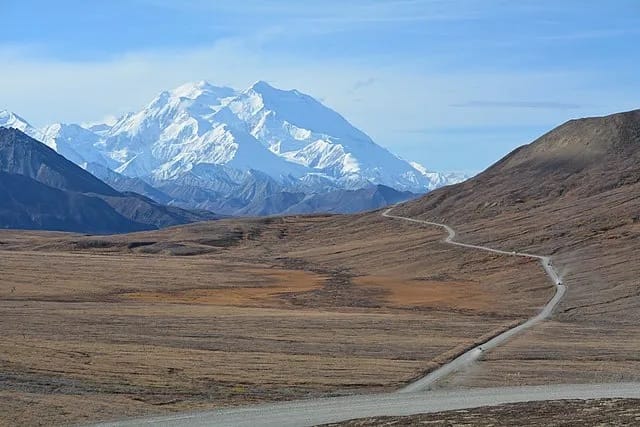America’s highest mountain had a name before a gold prospector in 1896 decided to call it Mount McKinley after a presidential candidate he liked, William McKinley. The Koyukon people who inhabited the area around the mountain have referred to the peak as “Denali” for centuries. During the Russian ownership of Alaska, the mountain's common name was Bolshaya Gora, the Russian translation of Denali. It was briefly called Densmore’s Mountain in the late 1880s and early 1890s after Frank Densmore, a gold prospector who was the first non-native Alaskan to reach the mountain base.
The United States formally recognized the name Mount McKinley after President Wilson signed the Mount McKinley National Park Act of February 26, 1917. In 1965, Lyndon B. Johnson declared the north and south peaks of the mountain the “Churchill Peaks” in honor of British statesman Winston Churchill. The Alaska Board of Geographic Names changed the mountain's name to Denali in 1975, which was how it is called locally. A request in 1975 from the Alaska state legislature to the United States Board on Geographic Names to do the same at the federal level was blocked by Ohio congressman Ralph Regula, whose district included McKinley’s hometown of Canton.
On August 30, 2015, the Barack Obama administration announced the name Denali would be restored in line with the Alaska Geographic Board’s designation. U.S. Secretary of the Interior Sally Jewell issued the order changing the name to Denali on August 28, 2015, effective immediately. Jewell said the change had been “a long time coming.”
The renaming of the mountain received praise from Alaska’s senior U.S. senator, Lisa Murkowski (R-AK), who had previously introduced legislation to accomplish the name change, drawing criticism from several politicians from President McKinley’s home state of Ohio. The Alaska Dispatch News reported that the Secretary of the Interior has authority under federal law to change geographic names when the Board of Geographic Names does not act on a naming request within a “reasonable” period of time. Jewell told the Alaska Dispatch News, “I think any of us would think that 40 years is an unreasonable amount of time.”
When Donald Trump announced he’d be changing the name back to McKinley, you might wonder when Trump became a historian and whether he even knew who McKinley was or what he’d accomplished. There are several reasons why McKinley’s accomplishments may have been brought to Trump’s attention (you know he doesn’t read) and why Trump might genuinely like him.
William McKinley liked tariffs, which Trump has embraced as a solve-all for the economy, though they will most likely spike inflation and raise prices on almost everything. McKinley was dealing with a far different world economy, but don’t expect Trump to acknowledge that.
McKinley was an expansionist. He believed in Manifest Destiny, was responsible for the annexation of Hawaii, and laid the groundwork for the acquisition of the Panama Canal, which Trump now wants to take back. To be clear, McKinley had nothing to do with Alaska becoming a state, which happened in 1959, well after he died in 1901. McKinley never visited Alaska. His only ties to the state were related to the admiration of a gold prospector he’d never met.
Trump has another association with McKinley. They were both shot. Trump had his ear grazed in an assassination attempt. McKinley was shot twice in the stomach, wounds he ultimately died from. Both had financial scandals. Trump’s are ongoing, and McKinley guaranteed the loans of a friend who went under.
Trump and McKinkey did little to acknowledge the racism of their respective times toward Black people. When black postmasters at Hogansville, Georgia, in 1897 and at Lake City, South Carolina, the following year, were assaulted, McKinley issued no statement of condemnation. When a group of white supremacists violently overthrew the duly elected government of Wilmington, North Carolina, on November 10, 1898, in an event that came to be recognized as the Wilmington insurrection of 1898, McKinley refused requests by black leaders to send in federal marshals or federal troops to protect black citizens, and ignored city residents’ appeals for help to recover from the widespread destruction of the predominantly black neighborhood of Brooklyn. After the release of the George Floyd videos and the resulting nationwide protests. Trump’s general response was to condemn Black Lives Matter.
The more anyone explained to Trump who William McKinley was (he still doesn’t read), the more Trump would have liked him. Maybe it’s just because he favored tariffs. I think a little of the rest impressed Trump as well.
The renaming of Mount Denali would demonstrate a total lack of concern for the people who live there, which wouldn’t bother Trump in the least. I suspect Alaskans will keep on calling it Denali, as they always have.
This article originally appeared on Medium and is edited and republished with author's permission. Read more of William Spivey's work on Medium.
